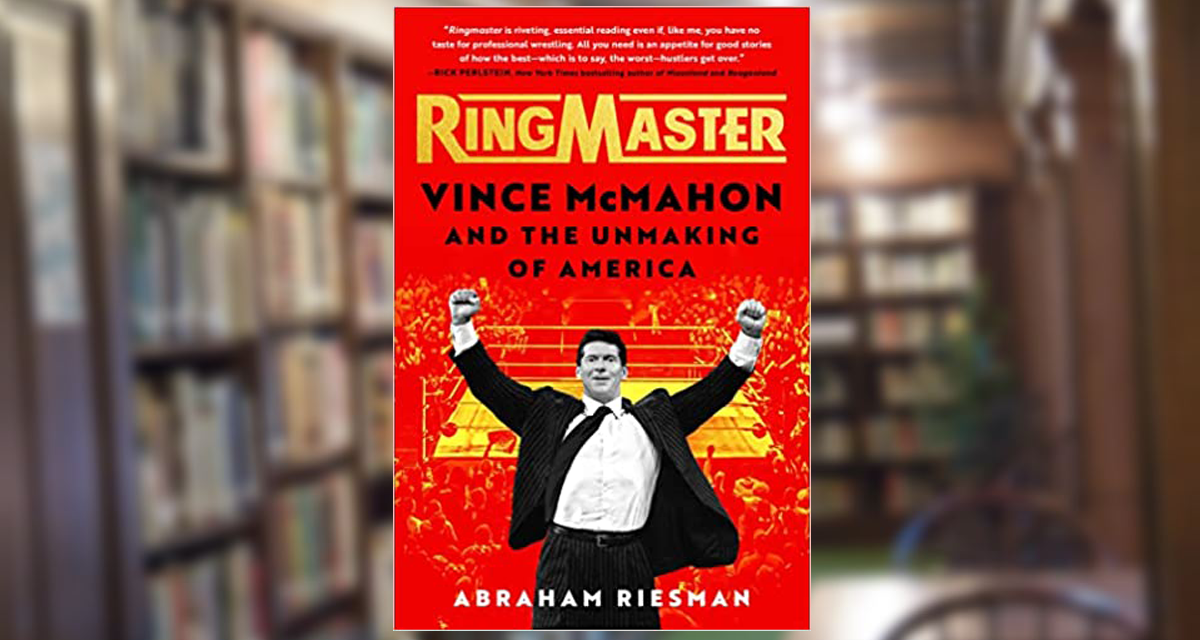On the 20th anniversary of her talk show, Oprah Winfrey reflected on her many interviews with author/Holocaust survivor, the late Elie Wiesel. She observed that the are some interviews you do just for yourself. This reader/journalist felt the same way about interviewing author Abraham Josephine Riesman.
Riesman is the author of the upcoming Vince McMahon biography, RingMaster: Vince McMahon and the Unmaking of America. The much-anticipated biography will be published by Atria Books, an imprint of Simon & Schuster, Inc., and officially released on March 28, 2023. McMahon is of course the former Chairman and CEO of World Wrestling Entertainment (WWE). Or so we thought… in the ongoing saga generating headlines in both pro wrestling and the mainstream media, at press time McMahon has returned to the WWE board and has been elected as Executive Chairman. McMahon’s daughter, Stephanie McMahon, who had taken on the role of Co-CEO and Chairwoman when her father “retired,” in turn resigned from the company and there are rumors abound, but nothing yet confirmed, about a potential sale of the WWE. There’s also a plethora of lawsuits, settlements, and hush money, oh my!
Upon hearing the news about the biography, I was immediately curious about Riesman. Just who would be crazy/capable enough to tackle a biography about such an important/divisive/controversial figure in pro wrestling? Turns out it’s 37-year-old Riesman who is based in Rhode Island, is a Harvard graduate, and is also a journalist whose prose has appeared in New York magazine, The Wall Street Journal, and The Boston Globe among other publications. Riesman has also recently come out as transgender and uses she/they pronouns, so that’s what I will be using in this article.
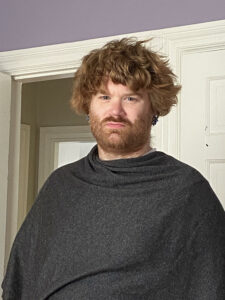
Abraham Josephine Riesman. Photo credit: S.I. Rosenbaum.
So even though I could have just done a review article on her book — which I did do — I just had to interview her for myself. And spoiler alert: she exceeded my very high expectations.
As soon as the McMahon biography was announced in 2020, I instantly began following Riesman’s witty, quirky, and sharp perspectives on Twitter. So even though we had not met in person or had a proper conversation, in a lot of ways I felt like I already knew her.
Riesman told me she chose to become a writer after initially planning to become an actor. Deciding the stage ultimately wasn’t for her, she started pursuing journalism. Being born and raised in Chicago, she was a big fan of the late critic Roger Ebert’s work. She also devoured every issue of Wizard magazine, which focuses on comic book culture. Her interests and journalistic journey eventually led to Riesman writing her first book, 2021’s True Believer: The Rise and Fall of Stan Lee.
Her second book is the McMahon biography. Naturally I had to ask why she would choose to write a book about McMahon.
“Why wouldn’t I?” she asked enthusiastically in our phone interview. “He’s one of the most fascinating figures in American life!”
Riesman first became interested in pro wrestling at the age of six. She thought Hulk Hogan ripping off his shirt each night before his matches was the “most bad-ass thing.” So much so she asked her mother, to whom the book is dedicated, to make Riesman her own version of the shirt.
“I love my mother for many reasons,” Riesman explained. “But one of them is that she sewed me a little rip apart T-shirt where she cut a slit down the middle. Not all the way down, but just most of the way. And then put in little holes and tied shoe strings. So, it was sort of looped together and I could pull at the cut and pull the shoe strings apart. And it was like I was ripping the shirt open. And I thought that was the most wonderful thing!”
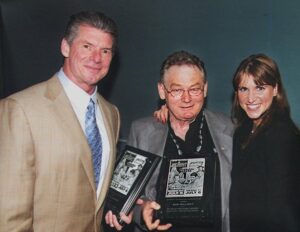
Vince and Stephanie McMahon with Bob Holliday in July 2004.
Riesman says she lost interest in pro wrestling pretty quickly and moved on to Star Wars and other interests. She said she would actually hate pro wrestling at the age of 13 “because all of my bullies loved Stone Cold Steve Austin.” But she was encouraged to rethink her stance when a childhood friend was watching WWE programming and insisted it was so bonkers, she had to give it another shot. It was around the spring of 1999, and it was Riesman’s first exposure to the WWE’s infamous Attitude Era and Riesman admits she “fell in love instantaneously” and was “completely captivated.” Like so many of us she would make plans to watch the pay-per-views and immerse herself completely in the community.
“I was totally in the palm of Vince McMahon’s hand,” she admitted. “I was having the exact experience that Vince McMahon wanted — a young, assigned male at birth person — to be having to his wrestling product. I was just captivated and didn’t quite know what was real and what was fake and didn’t really care. I liked getting caught up in the emotion of it. I liked having the community of it, all that stuff. And Vince himself was a fascinating figure for me as a kid.”
Riesman would take a second hiatus from pro wrestling in late 2001. This break would be much longer stretching 20 years. Her aforementioned first book on Stan Lee was published and now it was time to think about book two. The idea of a biography on McMahon came out of a discussion with her spouse although neither can remember who initially suggested him.
“It just sort of flowed from there,” Riesman recalled. “As soon as we had decided that Vince was a decent idea, I started poking into Vince’s past and reading about the behind the scenes Vince. Even at just a cursory glance, I was like, ‘Jesus there is such a story here that has not really been told, and certainly hasn’t been told in an updated form.’ There was (2004’s Sex, Lies, and Headlocks: The Real Story of Vince McMahon and World Wrestling Entertainment by Shaun Assael and Mike Mooneyham) the partial biography that came out decades ago. But with all due respect to that book, which helped me a tremendous amount, there was a lot in it that was inaccurate. And there were no citations. It was just sort of a wrestling book. And I’m not saying that to diss it, it’s just it’s in a genre of wrestling writers writing about wrestling where there are certain conventions that don’t apply there, which I feel should apply. Such as citing your sources for one thing.”
It’s appropriate to point out here that Riesman’s McMahon biography has over 1,800 end notes!
“I had a lot of f***ing end notes!” laughed Riesman, who spent approximately two and a half years working on this book. “Well, here’s the thing. Part of that was, I want to just be diligent. But another part of it was future researchers need these citations even if some of them are super obvious. Because there are so few books that cite their sources about wrestling. Not zero, but there are so few them that I’m like, this is a major publisher, this is going to go in archives. I’m not sure if it’s going to be a hit at sales, but it’ll go into archives as a print object. I want the scholars of the future to have at least one more book that is about wrestling and actually point them in the direction or more information.”
Riesman’s research process for the book, which is unauthorized although Riesman prefers the word “independent,” had her immersing herself into the world of pro wrestling after her lengthy absence. This meant reading many of the pro wrestling books, biographies, and autobiographies in existence. She was also introduced to VICE’s Dark Side of the Ring series. (In December of 2022, Vice TV released the documentary The Nine Lives of Vince McMahon. To this viewer, Riesman was notably absent from this project so naturally I had to ask her why she wasn’t a part of it: “For reasons I can’t get into, but have nothing to do with disrespect for them or for VICE, I couldn’t participate. They’re nice folks. There’s no ill will there. It just didn’t work out.”)
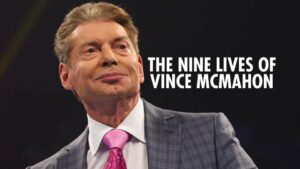
Riesman also conducted a lot of interviews; she estimates the total came to upwards of 150. There is no interview from McMahon himself or his wife, Linda, or children Shane and Stephanie, but that’s not from a lack of trying. Before the announcement about the upcoming book was going to come out, Riesman reached out to one of the WWE’s lead publicists.
“It was a courtesy email basically saying that tomorrow you’re going to hear this book is coming out and I didn’t want you to get caught off guard,” she said. “And if there’s any way, we can collaborate in terms of me being able to interview people, let’s have that discussion about whether we can find terms that make sense. And to his credit, the publicist wrote back and said, ‘Thanks for letting me know. I will see what I can do, but don’t hold out too much hope.’ And that was basically the last I heard from WWE.”
Riesman added, “I am not surprised. I cannot imagine anyone in corporate wanting to let Vince do that. And I also can’t imagine Vince wanting to do it. I mean there was a brief sliver of time around the turn of the millennium where Vince started really opening up to people or at least saying stuff that sounded like he was opening up.”
For the book, Riesman indeed referenced the scarce media interviews McMahon has participated in. Most notably McMahon’s seemingly unguarded, shocking, and often uncomfortably candid 2001 interview with Playboy magazine; his appearances on TSN’s Off the Record with Michael Landsberg; and a never published 2003 interview conducted by author/former WWE employee Brian Solomon. Riesman pointed out that she received no push back or negative reaction from the WWE over writing the book.
Riesman did conduct interviews with some of McMahon’s relatives, childhood friends, and pro wrestling figures: Solomon; Dave Meltzer; David Bixenspan; Bret “Hitman” Hart; Wendi Richter; Rita Chatterton (a former WWE referee who would accuse McMahon of sexual assault); Adnan Alkaissy (better known to wrestling fans as the manager of Sgt. Slaughter, General Adnan); Sharon Mazer; and Eero Laine. (Both Mazer and Laine were editors of and contributors to the academic pro wrestling book, Professional Wrestling: Politics and Populism.)
A tad spoiler here, but the narrative of the book effectively ends in 1999, although it must be pointed out there is an Epilogue. Riesman says she had planned to do a book on McMahon’s entire life but had to alter her plans.
“There was just too much life to fit in there,” she revealed. “I had a word count and we didn’t want to go over it because you don’t want a long wrestling book to try and market. You don’t want to try and market a very long wrestling book to a mainstream audience because they’re already skeptical about the wrestling aspect. They’re not going to buy an 800-page biography of Vince as of now.”
So, does that mean we readers will get a sequel?
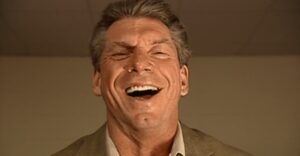
“I have interviews with a ton of people who don’t really figure into this book because they entered Vince’s life after 1999,” she offered. “And a lot of material from people who are in the book, but who I talked to about the post ’99 period. There’s a lot of material that I’m hoping to use in a sequel on day. I have no idea when that’ll happen. Don’t misread me there and think that this is something that is set in stone or anything, it’s just a desire. I would like at some point (to do a sequel) when it makes sense. And that could be soon or it could be far from now, to write some kind of sequel or something that at least picked up the narrative from ’99 and takes it to whenever the present is as of when I write it.”
As mentioned in this article, Riesman recently came out as transgender. With wrestling fans still being a predominantly conservative audience, it must be asked if this journey affected any aspect of the book’s release in any way.
“Not so far!” Riesman confirmed. “I’ve been very blessed to have a supportive real-life community and online community of people who have been nothing but nice about my gender journey. And wrestling has been weirdly okay. The wrestling fans have been weirdly pretty okay with it. I mean, I shouldn’t say weirdly because the wrestling fans that I tend to associate with and actually see on my feed, tend to be part of the crowd of queer and transgender wrestling fans, which there is a huge crowd of.”
Riesman relayed that there have been some comments along the realms of “Look at this man with a mental illness in a dress!” But she’s more than ready for any bullies or trolls.
“If somebody is gonna be transphobic to me, they’d better come with the big guns to actually hurt my feelings,” she asserted. “Because all of the little stuff has been said so many times that I’m immune to it!”
As readers can probably conclude, Riesman and I had a lengthy interview. It’s definitely one of the longer ones I’ve had in all of my years writing and reading about pro wrestling. There’s so much more to include here. Maybe this interview needs a sequel! But there were two things people kept asking me about when they heard I was going to be reading this book for SlamWrestling.net.
The first: with new headlines about McMahon arriving almost daily, was there any last-minute scrambling to add in more details to keep the book as current as possible?
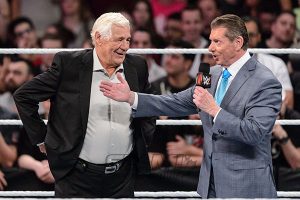
Pat Patterson and Vince McMahon after WWE Monday Night Raw went off the air on May 4, 2015, at Montreal’s Bell Centre, for a special Pat Patterson tribute. Photo by Minas Panagiotakis, www.photography514.com
Surprisingly, Riesman said there really wasn’t any real scrambling aside from a few updates to the Introduction, Epilogue and, some word tenses. She explained: “Here’s how I have approached (the book). I don’t think anyone who reads this book and then sees these allegations against Vince that have come up since the book was finalized is going to be surprised or confused. I think when you have read RingMaster and then you learn about what’s happened since RingMaster was completed, you’ll see that it’s all a straight line. There’s nothing in my book where I say, ‘And as we all know, Vince was never ever accused in sex crimes.’ I don’t say that! So you’re not gonna then hear about the alleged sex crimes and feel like I pulled one over on you. It’s just that there were new developments that are in keeping with the Vince that I portray in the book. So, yes there was a little bit of last-minute changing while I was getting finished up this summer just to have the Epilogue be up to date. But because the core narrative ends in ’99, I didn’t have to actually change anything in the structure.”
The second: again with new headlines about McMahon arriving on the fly, was there any part of Riesman that wished her book was coming out later so she had more time to include this updated information?
Riesman is quick to adamantly shout out, “No! No!” She says she wants the book to come out as soon as possible and to hear feedback from readers. In particular she wants to know what they think about the concept of “neokayfabe” which is a term she coined that is a dominant theme in the book. It’s also something that goes beyond the world of pro wrestling and something she believes is McMahon’s “biggest legacy.”
“Neokayfabe is the idea that wrestling is fake and you tell the viewer wrestling is fake,” Riesman explained. “But then you don’t establish for the viewer how fake or what exactly is fake, or whether real things happen. You confuse the viewer rather than lie to the viewer if that makes sense. Neokayfabe is putting you in a state of perpetual confusion as to whether you’re looking at something that’s true or false. Or a little bit of both. You’re constantly doubting that. And neokayfabe rests on this principle of: give people the illusion that they’re seeing behind the scenes, and you’ve got them forever. If you can convince people that a lie you made up about something behind the scenes is the truth beneath the lie of wrestling, people aren’t going to dig any further.”
She concluded, “The thing that Vince leaves to the wrestling industry, and then to the greater world is this phenomenon I think of perpetually going, ‘Well, that can’t be real, but it wouldn’t make sense if it wasn’t real. But I don’t know what’s going on right now. But I can’t look away.’ That’s the key. ‘I don’t know what’s going on right now, but I can’t look away.’ Which is the state of everything, every industry right now, especially every media related industry, and every political industry is just based on. Let’s say stuff that is so transparently false yet rooted in maybe something resembling a truth. And just confuse the shit out of people until they give us their money or their attention, whichever is more valuable in whatever instance.”
RELATED LINKS
- Review: Riesman’s Vince McMahon bio ‘a victory’
- Buy RingMaster: Vince McMahon and the Unmaking of America on Amazon.ca or Amazon.com
- Abraham Riesman: Twitter and website
- SlamWrestling’s Master book list
- The McMahon family story archive
